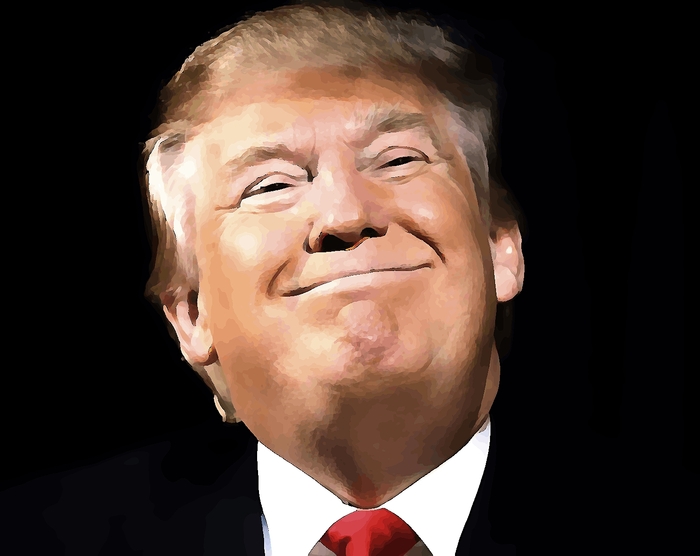
In fairness to Trump, he is not the first Republican president to impose tariffs on imports, to run a very large budget deficit, and to agree to meet a Communist tyrant. (I'm pretty sure he's the first to be sued by a porn star, but let's leave Stormy Daniels out of this.) Both Richard Nixon and Gerald Ford imposed tariffs in the name of national security. Both Ronald Reagan and George W. Bush ran substantial fiscal deficits. And if Trump goes to Pyongyang, there will be an unmistakable echo of Nixon's famous trip to Beijing in 1972.
Nevertheless, there is a near-universal consensus among political commentators that Trump is breaking all the rules. By announcing tariffs of 25 percent on steel imports and 10 percent on aluminium, he not only will hurt all those sectors of the US economy that depend on those imports, but also risks plunging the world into a protectionist trade war.
By agreeing to meet with the North Korean dictator Kim Jong Un, it is said, he is falling into a trap other presidents were prudent enough to avoid, for Kim will claim a diplomatic victory — "See! The dotard treats me as an equal!" — and then cheat on any deal, as his father did in the 1990s.
To seasoned observers of Washington life, this really is a shocking way to run an administration. Most shocking of all is not so much the policy as the way it gets made. Gary Cohn's departure last week as Trump's chief economic adviser was just the latest of a succession of exits from the White House. This is not the way it's supposed to work. By year two of any administration, the adults are supposed to have taken charge.
To give Trump his due, he is capable of self-mockery. His speech at the recent Gridiron Club dinner might equally well have been delivered by Alec Baldwin, whose career has been relaunched by his Trump impersonation on "Saturday Night Live."
"I won't rule out direct talks with Kim Jong Un," said Trump. "I just won't. As far as the risk of dealing with a madman is concerned, that's his problem, not mine."
And Trump contrasted his current job with his previous role as host of "The Apprentice": "In one job I had to manage a cut-throat cast of characters, desperate for TV time, totally unprepared for their roles and their jobs and each week afraid of having their asses fired, and the other job I was the host of a smash television hit."
Here is a man who glories in breaking the rules, because that is how he rules.
Notice, too, that in the middle of this comedy routine, Trump revealed exactly what he was planning to do with respect to North Korea. "By the way," he told his audience, "a couple days ago they said, 'We would like to talk,' and I said, 'So would we, but you have to de-nuke, you have to de-nuke.' So let's see what happens. . . . We will be meeting, and we'll see if anything positive happens." Not a single news outlet got the joke that this wasn't a joke.
Of course, this could all end in just the kind of train-wreck-plus-dumpster-fire predicted ad nauseam by the president's critics. But consider, if you dare, what a future historian might one day write:
"President Trump had no experience of foreign affairs, but he soon grasped how disastrously his predecessor had bungled the North Korean nuclear threat. He applied sustained pressure on Pyongyang, directly through new UN-mandated sanctions, and indirectly by menacing China with threats of military action or a trade war.
"In March 2018, he stepped up the pressure by announcing new tariffs on steel and aluminium imports. These tariffs would have hurt America's allies more than China, but Beijing got the message. Xi Jinping was well aware a trade war directed by the US against China would hurt China much more than the United States, potentially reducing Chinese exports to America by up to 20 percent.
"The president's critics were stunned by the subsequent US-North Korean Strategic Arms Limitation Treaty, signed in Pyongyang in 2019, and utterly dumbfounded by the 2020 Chinese-American Trade Agreement, which committed China to eliminate the bilateral trade deficit by the end of his second presidential term."
Could it happen? I know it seems fanciful — and will be dismissed by some readers as an indefensible defense of a rule-breaking ruler. But, as I said, Nixon imposed a 10 percent tariff on nearly all imports in August 1971. He went to Beijing in February 1972. And he won a landslide victory in November of that same year.
Niall Ferguson's new book is "The Square and the Tower: Networks and Power from the Freemasons to Facebook." (Buy it at a 35% discount by clicking here or order in KINDLE edition at a 50% discount by clicking here). He is the Milbank Family Senior Fellow at the Hoover Institution, Stanford University, and a senior fellow of the Center for European Studies, Harvard, where he served for twelve years as the Laurence A. Tisch Professor of History.


 Contact The Editor
Contact The Editor
 Articles By This Author
Articles By This Author